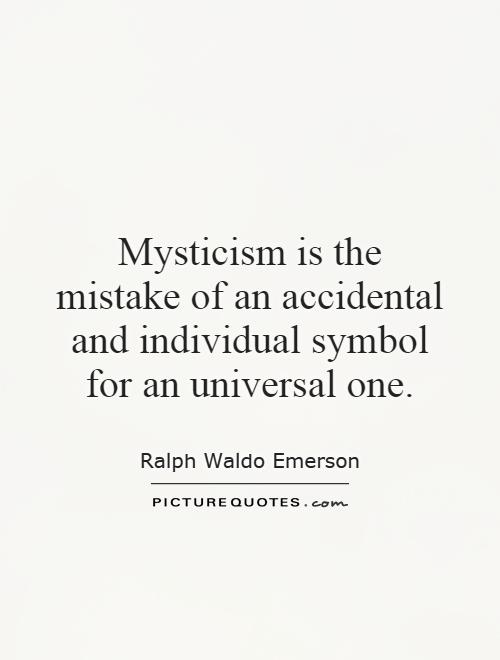Mysticism is the mistake of an accidental and individual symbol for an universal one

Mysticism is the mistake of an accidental and individual symbol for an universal one
Ralph Waldo Emerson, a prominent figure in the transcendentalist movement of the 19th century, was known for his philosophical writings that emphasized the importance of individualism, self-reliance, and the interconnectedness of all things in the universe. In his essay "The Over-Soul," Emerson explores the concept of mysticism and the idea that it is a mistake to confuse accidental and individual symbols with universal ones.Emerson believed that mysticism, or the belief in the existence of a spiritual reality beyond the physical world, was a natural and essential part of human experience. He saw mysticism as a way for individuals to connect with the divine and gain insight into the true nature of reality. However, Emerson also recognized the potential pitfalls of mysticism, particularly when individuals mistake their own personal experiences or symbols for universal truths.
According to Emerson, the mistake of confusing accidental and individual symbols for universal ones can lead to a distorted understanding of the spiritual realm. He believed that true mysticism required a deep and intuitive understanding of the interconnectedness of all things, rather than a reliance on superficial or arbitrary symbols. By mistaking personal symbols for universal truths, individuals risked losing sight of the deeper spiritual truths that underlie all existence.
Emerson's views on mysticism were influenced by his belief in the inherent goodness and wisdom of the individual soul. He saw mysticism as a way for individuals to tap into their own inner wisdom and connect with the divine source of all existence. However, he also cautioned against the dangers of mistaking personal experiences or symbols for universal truths, as this could lead to a distorted and limited understanding of the spiritual realm.












 Friendship Quotes
Friendship Quotes Love Quotes
Love Quotes Life Quotes
Life Quotes Funny Quotes
Funny Quotes Motivational Quotes
Motivational Quotes Inspirational Quotes
Inspirational Quotes